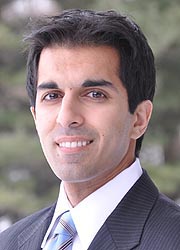Local
Disbelief, backlash after vote against marriage
Colleagues, former friends denounce Md. Del. Arora; aide resigns in protest


Del. Sam Arora changed his mind on the marriage bill, which he once sponsored, and voted against it last week. (Courtesy photo)
Maryland Del. Sam Arora’s decision to vote against the same-sex marriage bill last week proved unpopular with many in his progressive Montgomery County district, but no one was more disappointed than Arora’s own state senator, Roger Manno.
Sen. Manno (D-District 19), in a lengthy interview with the Blade, recalled his ultimately unsuccessful efforts to persuade Arora to support the bill, stretching back to last year.
“It’s a very tough situation,” Manno said. “I’m extremely concerned and disappointed and have spoken to constituents who are confused and concerned. I’m so … deeply disappointed and sad that Sam could not get there for whatever reason.”
Manno said he began meeting regularly with Arora shortly after he was elected in 2010 and heard that the freshman delegate was struggling with the marriage issue. Arora had campaigned on a pledge of support for the bill and even co-sponsored it initially before changing his mind last year.
“I could sense there could be a problem,” Manno said. “And I tried to mentor him. Freshmen make mistakes here and it’s easy to do things that are damaging to your career and that hurt people.”
So Manno and several other members of the Montgomery County delegation to Annapolis tried “to get him to see the issue as we saw it.”
“In my heart, marriage equality is an important and timely issue of emancipation for loving families who happen to be of the same sex,” Manno said.
After the marriage bill died in the House last year and the session ended, Manno said Arora took time off to study for the bar exam. Then last summer the two colleagues met again to discuss marriage.
“We sat for several hours and talked about his thoughts on marriage equality and where he was on the bill and he represented it was a crisis of faith,” Manno said.
At that point, Arora expressed a range of concerns about the bill, Manno said, including religious, moral and constitutional objections. Still, Manno urged Arora to keep an open mind because he knew that Gov. Martin O’Malley was planning to introduce the marriage bill in 2012. In late summer, Manno asked Arora to join him at a press conference where O’Malley announced his plans for the marriage bill, but Arora failed to show up.
When the 2012 session started last month, Manno said he continued to reach out to Arora, culminating with an hour-long meeting last week before a joint committee vote on the marriage bill; Arora serves on the Judiciary Committee, which was considering the measure.
“I didn’t know where he was going to go that week,” Manno said. Arora ultimately abstained from voting in committee at which point, “I put my head in my hands and said, ‘oh no,’” Manno said. After the committee sent the bill to the House floor, Arora received multiple calls from senior Democrats seeking his support, including O’Malley and former President Bill Clinton.
“When he went to the floor, I was there in the House chamber to give him a hug and let him know he had my support to vote for equality,” Manno said. “The vote came Friday, I was on the floor, I sent him a text a minute before the vote. I believed at the end of the day he would put a green vote on the board and he didn’t. The chamber erupted in jubilation, rightfully so, but I was standing on the floor with my head hung because Sam had disappointed a lot of people.”
Arora has yet to publicly disclose his reasons for opposing the bill after once sponsoring it. He has refused repeated interview requests from the Blade and other media outlets since last year.
Joshua Lapidus, Arora’s legislative director, quit in protest Friday night just after the marriage vote in a scathing resignation letter obtained by the Blade.
“I respect you and your beliefs, however I cannot respect your decision to place personal religious belief over the roles and responsibilities of the stewardship the people of District 19 entrusted unto you,” Lapidus wrote. He added, “It saddens me that you are standing against the tide of history and ending your career over an issue that will no doubt be decided in the affirmative, with or without your vote, over the next couple years. So, I write this letter to inform you that if you vote don’t vote for HB 438 l can no longer work under your employ.”
Arora issued a brief statement to the Blade in response to Lapidus’s resignation.
“I don’t comment on personnel issues,” Arora wrote. “That said: Josh continues to be a friend, and I wish him well.”
Another one-time friend of Arora’s, columnist and Democratic strategist Karl Frisch, praised Lapidus for stepping down.
“I think it’s gutsy,” Frisch said. “It’s the right move and shows that we had allies working on our behalf in his office.”
Frisch, a D.C. resident, donated $100 to Arora’s campaign in 2010 and said he knew Arora socially for several years. But after rumors emerged that Arora’s marriage position was changing, Frisch said his calls and emails went unreturned.
“I feel personally betrayed,” Frisch said. “I don’t take candidates’ word for it — he was listed as a co-sponsor of the bill and filled out an Equality Maryland questionnaire [on marriage]. … I’m used to politicians lying, I’m not used to being lied to by a friend.”
After Friday’s vote, Frisch said he took part in a conference call with a group of “national and Maryland-based political operatives to discuss every tool we can deploy to send Sam packing in 2014.” Manno said he wasn’t on that call but noted that politicians have to answer to their constituents.
“A former boss of mine once said that politics is about loyalty — to people, ideas, communities. At the end of the day, that’s really what we do,” Manno said. “Politicians have to answer for what we do in the next election and we all have to answer for what we do in the next life and I try to keep that in the forefront of my thoughts everyday.”
Manno, 45, is straight and married but credits his upbringing in the diverse and gay-friendly neighborhoods of Chelsea and Greenwich Village in New York for influencing his views on marriage. He once interned in the Clinton White House for Richard Socarides, who advised Clinton on gay-related issues.
“Marriage is a terribly uncomplicated issue,” he said. “If you love people and want to see that spark ignite, you have to love everyone.”
Maryland
Montgomery County police chief discusses arrest of trans student charged with planned school shooting
County executive tells news conference student’s trans identity is irrelevant to criminal charge

Montgomery County, Md., Police Chief Marcus Jones joined other county and law enforcement officials at a news conference on Friday, April 19, to provide details of the police investigation and arrest of an 18-year-old high school student charged two days earlier with threats of mass violence based on information that he allegedly planed a mass shooting at the high school and elementary school he attended in Rockville, Md.
In charging documents and in a press released issued on April 18, Montgomery County Police identified the arrested student as “Andrea Ye, of Rockville, whose preferred name is Alex Ye.”
One of the charging documents states that a friend of Ye, who police say came forward as a witness who played a crucial role in alerting authorities to Ye’s threats of a school shooting, noted that Ye told the witness that Ye identified as the transgender student he wrote about as a character in a 129-page manifesto outlining plans for a school shooting. Police have said Ye told them the manifesto was a fictional story he planned to publish.
At the news conference on Friday, Police Chief Jones and other law enforcement officials, including an FBI official and Montgomery County Executive Marc Elrich, referred to the student as Alex Ye and Mr. Ye. None of the officials raised the issue of whether Ye identified as a transgender man, seven though one of the police documents identifies Ye as a “biological female.”
County Executive Elrich appeared to express the views of the public officials at the news conference when one of the media reporters, during a question-and-answer period, asked Elrich why he and the others who spoke at the news conferment failed to “admit that this individual was transgender.”
“Because it’s not a lead,” Elrich replied, asking if the press and law enforcement authorities should disclose that someone arrested for murder is “a white Christian male who’s heterosexual.” Elrich stated, “No, you don’t – You never publish somebody’s sexual orientation when we talk about this. Why you are focusing on this being a transgender is beyond me. It’s not a news story. It is not a crime to be transgender.”
The reporter attempted to respond but was cut off by the press conference moderator, who called on someone else to ask the next question.
In his remarks at the press conference Chief Jones praised the so far unidentified witness who was the first to alert authorities about Ye’s manifesto appearing to make threats of a mass school shooting.
“Now, this is a situation that highlights the critical importance of vigilance and community involvement in preventing potential tragedies,” Jones said. “I commend the collaborative efforts of the Montgomery County Police Department, the Federal Bureau of Investigation, the Rockville City Police Department, and the Montgomery County Public Schools, as well as Montgomery County Health and Human Services,” he told the gathering.
“Thanks to their swift action and cooperation a potentially catastrophic event was prevented,” Jones said.
Jones pointed out that during the current school year, police have received reports of 140 threats to the public schools in Montgomery County. He said after a thorough investigation, none of them rose to the level where an arrest was made. Instead, police and school officials took steps to arrange for the student making the threats and their parents to take remedial action, including providing mental health services.
“But this case is different,” Jones said. “This case is entirely different that takes it to a different level. It was a concerned witness who brought this matter to light by rereporting the suspect’s manifesto to the authorities. This underscores the value of community engagement and the ‘see something say something’ approach,” he said.
Jones mentioned at the press conference that Ye was being held without bond since the time of his arrest but was scheduled to appear in court for a bond hearing on Friday shortly after the press conference took place to determine whether he should be released while awaiting trial or continue to be held.
In his manifesto obtained by police, Ye writes about committing a school shooting, and strategizes how to carry out the act. Ye also contemplates targeting an elementary school and says that he wants to be famous.
In charging documents reported on by WJLA 7 and WBAL 11, the 129-page document, which Ye has referred to as a book of fiction, included writings that said, in part:
“I want to shoot up a school. I’ve been preparing for months. The gun is an AR-15. This gun is going to change lives tomorrow … As I walk through the hallways, I cherry pick the classrooms that are the easiest targets. I need to figure out how to sneak the gun in. I have contemplated making bombs. The instructions to make them are surprisingly available online. I have also considered shooting up my former elementary school because little kids make easier targets. High school’s the best target; I’m the most familiar with the layout. I pace around my room like an evil mastermind. I’ve put so much effort into this. My ultimate goal would be to set the world record for the most amount of kills in a shooting. If I have time, I’ll try to decapitate my victims with a knife to turn the injuries into deaths.”
Maryland
Rockville teen charged with plotting school shooting after FBI finds ‘manifesto’
Alex Ye charged with threats of mass violence

BY BRETT BARROUQUERE | A Montgomery County high school student is charged with what police describe as plans to commit a school shooting.
Andrea Ye, 18, of Rockville, whose preferred name is Alex Ye, is charged with threats of mass violence. Montgomery County Police and the FBI arrested Ye Wednesday.
The rest of this article can be found on the Baltimore Banner’s website.
District of Columbia
New D.C. LGBTQ+ bar Crush set to open April 19
An ‘all-inclusive entertainment haven,’ with dance floor, roof deck

D.C.’s newest LGBTQ+ bar called Crush is scheduled to open for business at 4 p.m. on Friday, April 19, in a spacious, two-story building with a dance floor and roof deck at 2007 14th St., N.W. in one of the city’s bustling nightlife areas.
A statement released by co-owners Stephen Rutgers and Mark Rutstein earlier this year says the new bar will provide an atmosphere that blends “nostalgia with contemporary nightlife” in a building that was home to a popular music store and radio supply shop.
Rutgers said the opening comes one day after Crush received final approval of its liquor license that was transferred from the Owl Room, a bar that operated in the same building before closing Dec. 31 of last year. The official opening also comes three days after Crush hosted a pre-opening reception for family, friends, and community members on Tuesday, April 16.
Among those attending, Rutgers said, were officials with several prominent local LGBTQ organizations, including officials with the DC Center for the LGBTQ Community, which is located across the street from Crush in the city’s Reeves Center municipal building. Also attending were Japer Bowles, director of the Mayor’s Office of LGBTQ Affairs, and Salah Czapary, director of the Mayor’s Office of Nightlife and Culture.
Rutgers said Crush plans to hold a grand opening event in a few weeks after he, Rutstein and the bar’s employees become settled into their newly opened operations.
“Step into a venue where inclusivity isn’t just a promise but a vibrant reality,” a statement posted on the Crush website says. “Imagine an all-inclusive entertainment haven where diversity isn’t just celebrated, it’s embraced as the very heartbeat of our venue,” the statement says. “Welcome to a place where love knows no bounds, and the only color or preference that matters is the vibrant tapestry of humanity itself. Welcome to Crush.”
The website says Crush will be open Tuesdays and Wednesdays from 4 p.m. to 12 a.m., Thursdays from 4 p.m. to 2 a.m., Fridays from 4 p.m. to 3 a.m., Saturdays from 2 p.m. to 3 a.m., and Sundays from 2 p.m. to 12 a.m. It will be closed on Mondays.
Crush is located less than two blocks from the U Street Metro station.
-

 Africa5 days ago
Africa5 days agoCongolese lawmaker introduces anti-homosexuality bill
-

 District of Columbia1 day ago
District of Columbia1 day agoReenactment of first gay rights picket at White House draws interest of tourists
-

 World5 days ago
World5 days agoOut in the World: LGBTQ news from Europe and Asia
-

 District of Columbia1 day ago
District of Columbia1 day agoNew D.C. LGBTQ+ bar Crush set to open April 19











